Suchergebnisse
Ergebnisband „Klimaneutrale Städte"
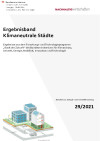
Der vorliegende Ergebnisband stellt abgeschlossene Projekte aus dem Forschungs- und Technologieprogramm „Stadt der Zukunft“ des Bundesministeriums für Klimaschutz, Umwelt, Energie, Mobilität, Innovation und Technologie (BMK) im Bereich Klimaneutrale Städte vor. Die gewonnenen Erkenntnisse sollen eine Entwicklung in Richtung energieeffiziente und klimaverträgliche Stadt unterstützen, die auch dazu beiträgt, die Lebensqualität und die wirtschaftliche Standortattraktivität zu erhöhen.
Schriftenreihe
29/2021
Redaktionelle Gestaltung: Bianca Pfefferer, Hannes Warmuth (ÖGUT)
Herausgeber: BMK
Deutsch, 22 Seiten
Downloads zur Publikation
Bewertung der Bauteilaktivierung als Option für Flexibilität im Strommarkt
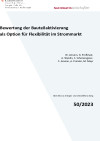
Um die Forschungsfrage dieser Studie nach dem zukünftigen Stellenwert der Bauteilaktivierung für die Energieversorgung zu beantworten, wurde ein Schätzmodell zum erwartbaren Neubau von Wohn- und Dienstleistungsbauten bis 2040 sowie der Sanierung von Bestandsbauten entwickelt.
Schriftenreihe
50/2023
W. Amann, G. Preßmair, A. Stipsits, S. Schoisengeier, C. Amann, A. Preisler, M. Mayr
Herausgeber: BMK
Deutsch, 75 Seiten
Downloads zur Publikation
Ergebnisband „Gebäudetechnologien“
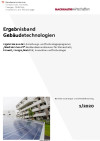
Der vorliegende Ergebnisband stellt abgeschlossene Projekte aus dem Forschungs- und Technologieprogramm „Stadt der Zukunft“ des Bundesministeriums für Klimaschutz, Umwelt, Energie, Mobilität, Innovation und Technologie (BMK) im Bereich innovativer Gebäudetechnologien vor. Die gewonnenen Erkenntnisse sollen eine Entwicklung in Richtung energieeffiziente und klimaverträgliche Stadt unterstützen, die auch dazu beiträgt, die Lebensqualität und die wirtschaftliche Standortattraktivität zu erhöhen.
Schriftenreihe
1/2020
Redaktionelle Gestaltung: Bianca Pfefferer, Hannes Warmuth (ÖGUT)
Herausgeber: BMK, Aktualisierung: Mai 2021
Deutsch, 25 Seiten
Downloads zur Publikation
Technologiereport: Digitalisierung der Bau- und Immobilienbranche
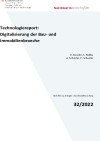
In der Vielzahl digitaler Möglichkeiten ist es nur sehr schwer möglich, einen Überblick zu behalten, Trends und Potentiale abzuschätzen sowie Zusammenhänge zu erkennen. Der vorliegende Report zielt daher darauf ab, den aktuellen Stand der Technik und die Markteinschätzung vielversprechender digitaler Technologien zu beschreiben. Es werden Informationen über konkrete Anwendungsfälle, Mehrwert und Herausforderungen der jeweiligen Technologien bereitgestellt. Die dargestellten Analysen dienen der Potentialbewertung und der strategischen Weichenstellung zur Integration der aktuell wichtigsten digitalen Technologien der Bau- und Immobilienbranche.
Schriftenreihe
32/2022
K. Künzler, S. Robbi, A. Schuster, P. Schuster
Herausgeber: BMK
Deutsch, 92 Seiten
Downloads zur Publikation
LINE-FEED - Plug-in Photovoltaik-Speicher für die Steckdose
Im Projekt LINE-FEED wurden Technologien entwickelt, die für einen Photovoltaik-Speicher benötigt werden, der von jedem Laien an einer gewöhnlichen Steckdose angeschlossen werden kann. Ziel war die Entwicklung eines Speichersystems für Haushalte in urbanen Räumen, welche selbst keine Möglichkeit der Installation einer Photovoltaikanlage haben.
LINE-FEED - Plug-in Photovoltaic Storage for the Wall Socket
The project LINE-FEED developed technologies that are required for a photovoltaic storage system which can be installed by anybody by simply plugging it into a wall socket. The aim was to create a storage system for households in urban areas that do not have the possibility to install a photovoltaic system themselves.
Ergebnisband „Urbane Wärme und Kälte“
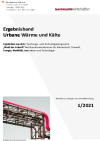
Der vorliegende Ergebnisband stellt abgeschlossene Projekte aus dem Forschungs- und Technologieprogramm „Stadt der Zukunft“ des Bundesministeriums für Klimaschutz, Umwelt, Energie, Mobilität, Innovation und Technologie (BMK) im Bereich Urbane Wärme und Kälte vor. Die gewonnenen Erkenntnisse sollen eine Entwicklung in Richtung energieeffiziente und klimaverträgliche Stadt unterstützen, die auch dazu beiträgt, die Lebensqualität und die wirtschaftliche Standortattraktivität zu erhöhen.
Schriftenreihe
1/2021
Redaktionelle Gestaltung: Bianca Pfefferer, Hannes Warmuth (ÖGUT)
Herausgeber: BMK
Deutsch, 24 Seiten
Downloads zur Publikation
Grüne und resiliente Stadt - Steuerungs- und Planungsinstrumente für eine klimasensible Stadtentwicklung
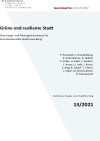
Ziel des Projekts war ein „Proof of Concept“ eines Regelkreises und Tool-Sets zur Steuerung, Optimierung und Evaluierung einer grünen und klimasensiblen Stadt(teil)planung bestehend aus städtebaulichen und freiraumplanerischen Instrumenten sowie Klimasimulationen auf unterschiedlichen Maßstabsebene.
Schriftenreihe
13/2021
F. Reinwald, C. Brandenburg, P. Hinterkörner, B. Hollósi, C. Huber, A. Kainz, J. Kastner, F. Kraus, U. Liebl, J. Preiss, Z. Ring, B. Scharf, T. Tötzer, J. Züger, M. Žuvela-Aloise, D. Damyanovic
Herausgeber: BMK
Deutsch, 124 Seiten
Downloads zur Publikation
Green SandboxBuilder: Regulatory Sandboxes im Bereich des nachhaltigen Bauens und Sanierens
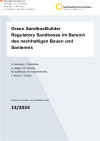
Im Projekt "Green SandboxBuilder" wurde erstmals in Österreich der Bedarf an Regulatory Sandboxes für ökologisch nachhaltige und klimawirksame Vorhaben im Baubereich systematisch erhoben. Die Umsetzung von Regulatory Sandboxes im österreichischen Bausektor kann dazu beitragen, die Einführung von technologischen, prozessualen und sozialen Innovationen entscheidend zu beschleunigen und somit die Nachhaltigkeitsziele zu erreichen.
Schriftenreihe
13/2024
G. Leimüller, J. Rohrhofer, A. Gerger, Ch. Schranz, M. Aichholzer, M. Schachenhofer, C. Benes, F. Ozclon
Herausgeber: BMK
Deutsch, 71 Seiten
Downloads zur Publikation
Monitoringprojekt „Gebäude als Speicher“. Einfamilienhaus H. (Wind) und Einfamilienhaus F. (Solar)
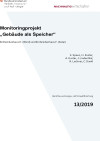
Monitoring und Vergleich der Leistungsfähigkeit der Thermischen Bauteilaktivierung in zwei bauähnlichen, bewohnten Einfamilienhäusern mit unterschiedlichen Energiequellen (Windstrom bzw. Solarenergie). Zentrales Anliegen ist es, die Funktionalität der Energieversorgung durch Wind- bzw. Photovoltaikstrom in Verbindung mit einem thermischen Speicher zu untersuchen. Die Ergebnisse liefern Erkenntnisse hinsichtlich Berechnungsannahmen, Anlagensteuerung sowie Umsetzbarkeit eines Smart-Grids.
Schriftenreihe
13/2019
S. Spaun, H. Kuster, A. Kuster, J. Lindenthal, R. Lechner, C. Dankl
Herausgeber: BMVIT
Deutsch, 53 Seiten
Downloads zur Publikation
BIMaterial Process Design for Material Building Pass
Building Information Modelling supported compilation of a Material Building Pass; as a qualitative and quantitative documentation of the material composition of, and the material distribution within, a building structure. This project is a central milestone towards standardized, BIM-generated building material passes.
Digitale Transformation der österreichischen Bauwirtschaft und Auswirkungen auf die Erwerbstätigen
In einer Trendanalyse werden wahrscheinliche Auswirkungen der digitalen Transformation in der österreichischen Bauwirtschaft auf den Branchen-Arbeitsmarkt untersucht. Auf Basis von Feedback von BranchenexpertInnen wird für die kommenden fünf bis zehn Jahre analysiert, für welche Berufsgruppen digitalisierungsinduzierte Effekte eher zu einer steigenden vs. sinkenden Arbeitskraftnachfrage führen.
HEROES - Häuser für Energie und RessOurcenEffiziente Siedlungen
Ein vereinfachtes Verfahren für die Berechnung von ökologischen Kennzahlen für bisher nicht betrachtete Gebäudeteile (thermisch nicht relevante Bauteile und Haustechnikkomponenten) wird entwickelt. Die methodischen Grundlagen für die Berechnung der Primärenergie u. der CO2-Emissionen im Betrieb und in den verbauten Materialien werden harmonisiert.
SOFC4City - SOFC-waste heat utilization for buildings and industry
In this project the application of a solid oxide fuel cell (SOFC) for energy supply (heat and power) of urban areas will be investigated. Due to the high temperature level of the produced heat it would be possible to use this heat for the energy supply of different heat and power consumers (residential buildings, industrial plants, etc.). One aim is to provide the SOFC-heat at several temperature levels in order to establish the advantages of the fuel cell. On the one hand the legal and market-based conditions will be evaluated, on the other hand the technological feasibility will be scoured by the use of CFD-simulation of the heat production.
Programmmanagement und Kommunikation in der missionsorientierten Forschungsförderung
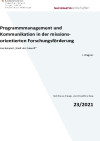
Diese Studie stellt sich die Frage, wie Programmmanagement und Wissenskommunikation in der missionsorientierten, angewandten Forschung konzipiert und effektiv umgesetzt werden können. Mittels Literatur- und Dokumentenanalyse, Stakeholderanalyse, internationaler Fallstudien, Interviews, Fokusgruppen sowie einem Co-Creationworkshop wurden Rückschlüsse auf die aktuelle Wirkung der Kommunikationsdimensionen des Programmes "Stadt der Zukunft" gezogen und Überlegungen hinsichtlich der Weiterentwicklungsmöglichkeiten zu Missionsorientierung nach OECD-Definition angestellt. Das resultierende Modell wurde in einem finalen Reflexionsworkshop mit dem Auftraggeber diskutiert.
Schriftenreihe
23/2021
I. Wagner
Herausgeber: BMK
Deutsch, 92 Seiten
Downloads zur Publikation
E_PROFIL - Quartiersprofile für optimierte energietechnische Transformationsprozesse
Mit E_PROFIL, als Methodenset zur Erstellung von Quartiersprofilen, wird ein wichtiger EDV-gestützter Werkzeugkasten geschaffen, der in der Planungspraxis österreichischer Städte zur Anwendung kommen wird, um eine energie- und ressourceneffiziente Stadtentwicklung zu unterstützen. Er ist ein wertvolles Asset für die Forschungs- und Planungsaktivitäten in Siedlungsverbänden.
Monitoring und Evaluierung von städtischen Energieflüssen
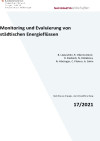
Ausgangsbasis für das Projekt sind die Energiestatistiken. In einem ersten Schritt wird die Erhebungsmethodik im Detail analysiert. Basierend auf den Erkenntnissen der Analyse wird eine Methodik zur Erstellung städtischer Energieflüsse erstellt. Diese wird mithilfe des zu entwickelnden Planungsinstruments "Senflusk" an 5 Referenzstädten getestet.
Schriftenreihe
17/2021
B. Lepuschitz, R. Obernosterer, H. Daxbeck, N. Kisliakova, N. Hörzinger, C. Ploiner, A. Sahin Berichte aus Energie- und Umweltforschung 17/
Herausgeber: BMK
Deutsch, 65 Seiten
Downloads zur Publikation
3D*3B - 3D-Betondruck und Bewehrung für emissionsarme biegebeanspruchte Tragstrukturen des Hochbaus
Interdisziplinäres Projekt zur Integration von 3D-Betondruckelementen in vorwiegend biegebeanspruchte Tragstrukturen mit dem Ziel der nachweisbaren Reduktion von klimarelevanten Emissionen im Baubereich. Die Ergebnisse dienen der umfassenden Beurteilung technischer, logistischer und klimarelevanter Aspekte.
Stakeholderprozess der Initiative "Referenzarchitektur für sichere Smart Grids in Österreich"
Das Projekt bereitete die Entwicklung einer Smart Grids Referenzarchitektur für Österreich unter Einbindung aller relevanten Akteure auf. Aus den technisch-wissenschaftlichen Grundlagen wurde ein Prozess erarbeitet, der die Anforderungen vom Infrastrukturbetreiber, der Industrie bis zu Bedarfsträgern abholt und zu einer national akzeptierten und international ausgerichteten Referenzarchitektur abstimmt.
THERM-opti-BALKON-P2 - Thermisch optimierte Balkonsanierung Phase 2: In-Situ-Versuchsanlage
Bei der thermischen Sanierung von Gebäuden stellen frei auskragende Balkone ein besonderes Problem dar. Mit dem THERM-opti-BALKON-System wird derzeit unter Laborbedingungen ein diesbezüglicher Lösungsansatz erforscht. Phase 2 soll eine In-Situ-Versuchsanlage unter realen Bedingungen als Technologiedemonstrator schaffen. Wichtigster Untersuchungsgegenstand ist das Langzeitverhalten des THERM-opti-BALKON-Systems.
